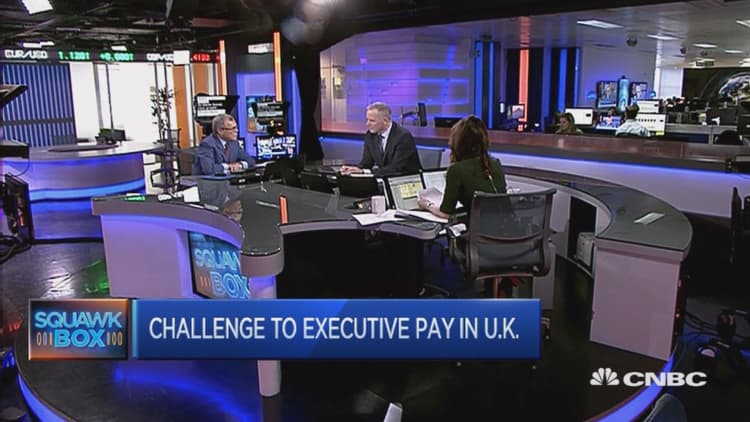
The average salaries of FTSE 100 chief executives fell by almost a fifth in 2016, shrinking the pay packets of some of the U.K.'s top earners by £1 million ($1.3 million).
The heads of Britain's 100 top companies by market capitalization earned an average of £4.5 million last year, down 17 percent from £5.4 million in 2015, according to new analysis from the Chartered Institute of Personnel and Development and the High Pay Centre, a U.K.-based think tank.
The figures, which are derived from the top 100 companies' earnings reports, account for salary, bonuses, incentives and employer pension contributions.
The fall was led by WPP's Martin Sorrell, whose pay packet slimmed by around a third from £70.4 million in 2015 to £48.1 million in 2016. Without this, the average overall fall would have been 15 percent.
However, the man at the helm of the world's largest advertising firm, remained the U.K.'s highest-earning FTSE 100 CEO last year, taking home more than twice the £22.4 million earned by Carnival's Arnold Donald, the second-highest paid chief.
'I make no apologies for success'
Sorrell has come under repeated criticism for his continued reign at the top of the pay rankings but he insists that his remuneration is justified by his 30 years spent taking the business from a £1 million capitalization to the £19 billion it is today.
In March 2016, Sorrell's base salary was £1.15 million but he received a share award worth £63 million for the previous year, plus other benefits such as pensions.

"I make no apologies for the success of that business … Over that period of time I've not sold any shares," Sorrell told CNBC at the time.
His pay is subject to shareholder discretion but as his earnings have fallen over recent years, so too has investor opposition.
"If you look at the history, it's an improving trend," Sorrell told CNBC in June, hours after WPP's annual general meeting.
Continued disconnect between bosses and employees
Though CEOs may be taking note of increasing pressure from investors and politicians over their generous pay packets, the report once again highlights the stark disconnect between bosses and their employees.
The average salary of a FTSE 100 CEO last year was 160 times that of the average U.K. worker. This means that it would take a typical Brit earning an annual £28,000 more than a century-and-a-half to match the same as the average FTSE business chief earns in a year.
"The ordinary employee looks at that number and they can't quite reckon with it, it seems like an enormous number compared to what ordinary people are going through," Stefan Stern, director of the U.K. think tank High Pay Centre, told CNBC on Thursday.
This, in turn, has fueled wider public discontent with their political systems, which many see as responsible for fueling, or at least accommodating, such pay disparity, Stern noted.
"I think there is a political problem and that's been manifested in some of the big political votes we've seen in the U.K. and the U.S. over the past couple of years."
The U.K. government has announced that it will present new proposals for executive pay in September.
Women remain underrepresented and underpaid
Just six women appear in this year's list of FTSE 100 CEOs, fewer than the number of males named David.
Their combined annual salaries amount to just one third of that of the highest paid male, WPP's Sorrell.
Female FTSE 100 CEOs in 2016 earned £2.6 million – 77 percent less than then average male – and though their numbers are rising within remuneration committees, there are still just 30 female executive directors across the index's 100 companies.
The figures come as the gender pay gap has come under renewed scrutiny in the U.K. after the BBC revealed that the salary of its top earning male is four times that of its highest earning female.


